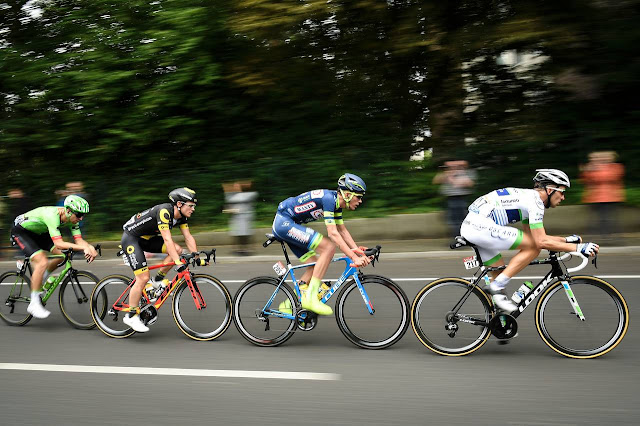Game Theories
Any coach or philosopher will tell you that the rules of sport mirror those of life (and vice versa). Michael Shermer reviews ‘Knowing the Score’ by David Papineau.
By Michael Shermer
A breakaway on July 2 during the Tour de France. Photo: Agence France-Presse/Getty Images
Among cycling aficionados, Peter Yates’s 1979 film “Breaking Away” was a welcome vehicle to convey the elegance of the sport to a largely oblivious American audience. Like most sports films, it was also something more: the story of a man struggling to break away from the provincialism of family and friends, along with a morality tale about how everyone lies a little and some people cheat a lot.
In “Knowing the Score,” King’s College philosopher David Papineau uses bike racing and other sports as metaphors for lessons about the most important issues in philosophy and life.
He confesses his ignorance of cycling and admits that he did not understand, when watching the 2012 Olympic road race, why four women cyclists from different countries would work together after they broke away from the peloton. Mr. Papineau finds an answer in game theory, the analysis of competition and cooperation between rational actors in a conflict situation. Cyclists drafting one another create a significant savings in energy and an increase in speed, so solo breakaways are unusual and almost always fail.
Drafting in the middle of the pack for the entire race is very efficient, but then you have to sprint for the win against the entire field. Ideal is a small breakaway with, say, four riders: Each can conserve energy and only has to beat three others to win. In game-theory terms, it pays for each of the four racers to cooperate with one another until the very end. If one rider “defects” (in game-theory terms) and refuses to take a pull at the front, the others will punish her, verbally or by other means.
Occasionally, in the final kilometer, everyone in the breakaway refuses to pull through in order to conserve energy for the sprint, and the group gets caught by the hard-charging peloton, an example of selfishness surmounting selflessness to the detriment of all. On the other hand, knowing that this can happen discourages early defection and keeps the provisional mutualism going.
Each chapter in Mr. Papineau’s engaging book takes a look at a philosophical problem like this, presented by a sport, and links it to phenomena in the wider world. The author finds cyclists’ conflicts between self-interest and group interest to be mirrored in relations between nations:
Agreements attempting to combat climate change, for instance, face a collective-action problem that must contend with “breakaway” nations that desire greater economic growth. In other sections, failure to meet political obligations in a society is equated to fouls in an athletic contest; sporting competition among nations is connected to geopolitical rivalry ( George Orwell once commented that sport “is war minus the shooting”); nature and nurture are discussed in terms of athletic performance and life (gifted athletes have gifted children, but not equally so). Mr. Papineau also applies economic concepts, like Coase’s theorem—stating that free markets with well-defined rules lead to relative efficiency—to sports, in which the best players migrate to the best teams and earn the most money unless an artificial mechanism like a draft is devised so as to level the playing field.
Another lesson that Mr. Papineau’s book imparts is that athletic contests are not just another form of play. Most people want more than just a happy existence. We want challenges to face and obstacles to overcome. Our ancestors got more of those from daily life than we do today, so we need artificial trials. Sports are, in that sense, the very embodiment of the human striving that brings meaning to life.
—Mr. Shermer is the author, most recently, of “Skeptic: Viewing the World With a Rational Eye.”

0 comments:
Publicar un comentario